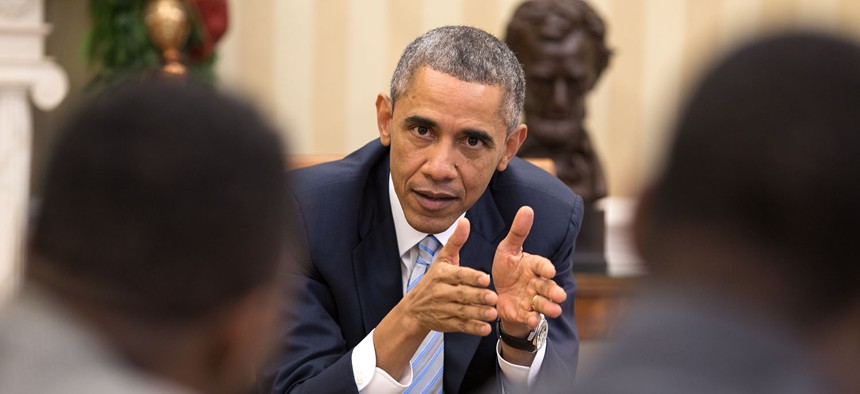
Pete Souza/White House
What Are the Alternatives to Obama's Iran Deal?
Israel’s prime minister says more sanctions will produce a better nuclear agreement. But the evidence suggests otherwise.
Benjamin Netanyahu insists that opposing Thursday’s framework nuclear dealwith Iran doesn’t mean he wants war. “There’s a third alternative,” the Israeli prime minister told CNN on Sunday, “and that is standing firm, ratcheting up the pressure until you get a better deal.”
There are three problems with this argument. The first is that even some of Netanyahu’s own ideological allies don’t buy it. Netanyahu and many Republican politicians—knowing that the American public doesn’t want war—insist that there’s a diplomatic alternative to the current deal. But over the years, key conservative foreign-policy experts, have said exactly the opposite. Eliot Cohen, a former Bush administration official who teaches at John Hopkins’ School of Advanced International Studies, has written that, “The choices are now what they ever were: an American or an Israeli strike, which would probably cause a substantial war, or living in a world with Iranian nuclear weapons, which may also result in war, perhaps nuclear, over a longer period of time. Understandably, the U.S. government has hoped for a middle course of sanctions, negotiations and bargaining that would remove the problem without the ugly consequences. This is self-delusion.” According to Max Boot of the Council on Foreign Relations, “The only credible option for significantly delaying the Iranian nuclear program would be a bombing campaign.” The Weekly Standard’s Bill Kristol has argued that, “It’s long since been time for the United States to speak to this regime in the language it understands—force. … We can strike at the Iranian Revolutionary Guard Corps (IRGC), and weaken them. And we can hit the regime’s nuclear weapons program, and set it back.” And over the last month alone, two other prominent hawks, John Bolton and Joshua Muravchik, have penned op-eds entitled, “To Stop Iran’s Bomb, Bomb Iran” and “War With Iran Is Probably Our Best Option.” Netanyahu may sincerely believe that there’s a preferable diplomatic alternative to last week’s deal. But it’s telling that for years now, many on his ideological side have disagreed.
The second problem with Netanyahu’s argument is that it’s based on bizarre assumptions about Iranian politics. According to Netanyahu, if the United States walks away from the current deal, Iran’s desperation to end global sanctions will lead it to scrap its nuclear program almost entirely. But Iran’s nuclear program is decades old and enjoys broad public support. Even Mir-Hossein Mousavi, the leader of the reformist Green Movement, declared in 2009 that if elected, “we will not abandon the great achievements of Iranian scientists. I too will not suspend uranium enrichment.”
It’s true that one wing of the current Iranian regime, led by President Hassan Rouhani and Foreign Minister Mohammad Javad Zarif, will accept substantial limits on Iran’s nuclear program in return for the lifting of sanctions. But Rouhani’s hardline opponents, who benefit politically and economically from the sanctions, fiercely oppose such a deal. Netanyahu thinks a more aggressive American posture, coupled with a demand for near-complete Iranian capitulation, will make Tehran accept terms that today not even Iranian doves accept. To grasp how absurd that it is, just reverse the lens. How would more aggressive Iranian behavior, coupled with a demand for near-complete American capitulation, affect the debate in Washington? Would it turn Tom Cotton into Noam Chomsky? Of course not. It would empower those Americans who most oppose a deal already.
It’s the same in Iran. If the United States scuttles Thursday’s deal, Ali Vaez, senior Iran analyst at the International Crisis Group told me, Rouhani and Zarif will “be totally discredited, marginalized. That would be the end of Rouhani’s attempt at talks to resolve this peacefully.” Rand Corporation Iran expert Alireza Nader added that, “If everything collapses and Rouhani has nothing to show for his efforts, the balance may go toward conservatives and ultra-conservatives and they can make it hard for him to go back to table.”
Finally, there’s a third, less well-appreciated flaw in Netanyahu’s argument. He assumes that after walking away from the current deal, the United States can “ratchet up the pressure on Iran.” In fact, the pressure will likely go down.
Yes, Congress can pass additional sanctions. But more American sanctions alone won’t have much effect. After all, the United States began seriously sanctioning Iran in the mid-1990s. Yet for a decade and a half, those sanctions had no major impact on Iran’s nuclear program. That’s largely because foreign companies ignored American pleas to stop doing business with the Islamic Republic.
As Tyler Cullis of the National Iranian American Council explains, the shift came in 2010 when the UN Security Council passed resolutions essentially blessing America’s financial sanctions on Iran. Armed with this UN imprimatur, the Obama administration convinced Europe to stop doing business with Iranian banks and to stop importing Iranian oil. And while China and India didn’t cease Iranian oil imports altogether, they significantly reduced them.
Why did the world suddenly crack down on Iran? Partly, it’s because the United States threatened that companies doing business with Iran would lose access to the American market. But America had been leveling that threat since the mid-1990s, and until 2010, foreign governments had largely ignored the threat. In 1996, for instance, after Bill Clinton signed a law giving the United States the right to bar foreign companies that invested in Iran’s energy sector from doing business in the U.S., the European Union threatened to take the United States to the World Trade Organization, and Clinton backed down.
Things changed in 2010 because the Obama administration—aided by the antics of then-Iranian President Mahmoud Ahmadinejad—convinced European and Asian governments that the only way to get a diplomatic deal with Tehran was to apply economic pressure first. This global pressure has now isolated Iran from the world economy in a way that American pressure alone never could.
But if the United States walks away from a deal that European and Asian governments support, those governments will not indefinitely maintain a sanctions regime that lacks domestic political support and costs them money. Last year, a reportby the European Council on Foreign Relations warned that “those [in the United States] blocking implementation of a final deal … could endanger the international consensus backing sanctions against Iran.” If Congress torpedoes a deal, the report predicted, Europe might react “by easing its unilateral oil embargo against Iran.” In addition, “China and Russia … may become more sympathetic towards Iran’s position and see an opportunity to further advance their own interests at the expense of the US.”
China, in particular, has a history of strong economic ties to Iran, a massive thirst for oil, and little interest in doing America’s bidding in the Middle East. If the United States walks away from a deal that Beijing has endorsed, it’s only a matter of time until China imports large quantities of Iranian crude. Chinese impatience is already starting to show. Beijing imported 30 percent more oil from Iran in 2014 than it had in 2013. As the International Crisis Group’s Ali Vaez observes, “The high-water mark of international sanctions is already behind us.”
Netanyahu thinks the United States can blow up the current nuclear negotiations and then “ratchet up the pressure” on Tehran. But if China and other nations respond by busting the international sanctions that have isolated Iran over the past few years, the pressure on Iran won’t go up. It will go down.
This doesn’t mean, as President Obama has suggested, that the only alternative to the current deal is war. But it does mean that all the other alternatives are bad.
If nuclear negotiations fail, Iran might still stop short of building a bomb. That way it could enjoy the deterrence that comes from “threshold” nuclear status without weaponizing, which might provoke its neighbors to build nukes themselves. It’s even possible that if the U.S. sabotages Thursday’s deal, a future U.S. president might strike another nuclear agreement with Tehran. But by that point, sanctions would likely have eroded and Iran’s nuclear program would be further along. Which means that such a deal, far from being tougher, would be a lot weaker than the current one.
The key flaw in Netanyahu’s critique of the Iran deal is his belief that America—having convinced the world to pressure Iran into accepting an agreement that enjoys global support—can now destroy that deal and expect the pressure to increase. It won’t. To the contrary, if America follows Netanyahu’s advice, Iran’s isolation will ease and America’s will grow. Perhaps it’s no surprise that a leader whose policies have so isolated his own country from the world is urging the United States down a similar path.







